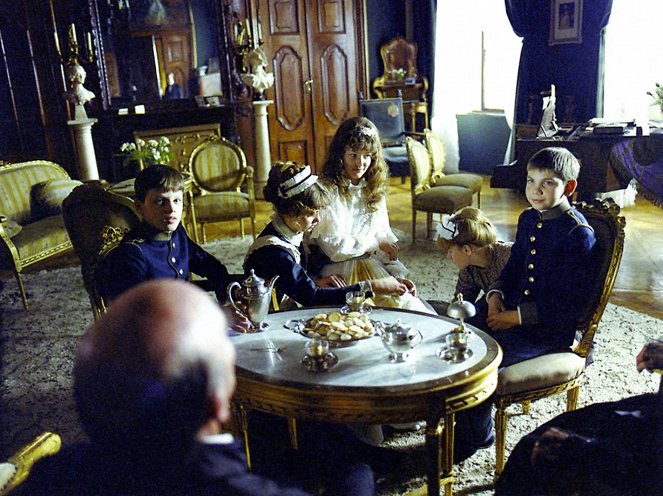Regie:
István SzabóKamera:
Lajos KoltaiMusik:
Zdenkó TamássyBesetzung:
Klaus Maria Brandauer, Gudrun Landgrebe, Hans Christian Blech, Armin Mueller-Stahl, Jan Niklas, László Mensáros, Tamás Major, Károly Eperjes (mehr)Inhalte(1)
Alfred Redl (Klaus Maria Brandauer), Sohn eines armen Eisenbahners, wird dank seines Fleißes in die Militärschule der österreichisch-ungarischen Monarchie aufgenommen. Er freundet sich mit Baron Christoph von Kubinyi (Jan Niklas) und dessen Schwester Katalin (Gudrun Landgrebe) an. Um ebenfalls dieser adligen Gesellschaft anzugehören, schlägt der karrieresüchtige Redl die Offizierslaufbahn ein. Jahre später, kurz vor Ausbruch des Ersten Weltkrieges, dient er als Hauptmann im österreichisch-ungarischen Grenzland. Er ist ein hervorragender Soldat, der von seinem Vorgesetzten, Oberst von Roden (Hans Christian Blech), mit väterlicher Zuneigung unterstützt wird. In Wien trifft Redl Katalin wieder, die zu seiner Geliebten wird.
Sie ist die einzige, der er zu gestehen wagt, dass er für ihren Bruder Christoph mehr als nur Freundschaft empfindet. Als das Kaiserreich zu zerbrechen droht, sieht Redl die Chance seines Lebens, sich zu beweisen. Er räumt auf und schafft diszipliniert Ordnung, bekommt jedoch auch viele Widersacher hinzu. Er wird befördert und kann in Wien endlich das Leben führen, nachdem er begierig strebte. Doch seine Feinde spinnen eine zerstörerische Intrige.
(EuroVideo Media)
Kritiken (3)
Biographical films are either historically accurate but uninteresting from a dramatic perspective, or they are interestingly written and filmed fictions that have borrowed the name of the main character from real history. István Szabó's Colonel Redl is not a biographical film in the true sense of the word, because it is based on a play by British playwright John Osborne, who was only loosely inspired by the fate of this officer, who was once convicted of espionage. On the other hand, it does not deviate significantly from Redl's life path, and Szabó can perfectly capture the atmosphere of the time period. Under his direction, a film was created that is not necessarily flashy, but a powerful and gripping story about an ambitious man who was able to discard many inhibitions in his desire for a career, but due to his low-born background and relative poverty, he encountered much stronger and more ruthless opponents, and the wheels of history ground him down. The film's story speaks volumes about the dubious morals of the powerful at the time, and about how things work in high politics. For me, it is the pinnacle of the director's work. Overall impression: 95%.
()
Während die Oberst-Redl-Affäre seit den 1920er Jahren Filmemacher immer wieder beschäftigt, scheint Szabós Version die letzte für viele Jahre zu sein. In den letzten Jahren scheinen wir das Interesse an den Jahren der Monarchie verloren zu haben. Und doch sind die Jahre voll von typischen spannenden Fällen wie dem von Alfred Redl (1864-1913). Aber nachdem ich die gesamte lockere Trilogie mit Klaus Maria Brandauer kennengelernt habe, bin ich davon nicht besonders beeindruckt. Als narzisstischer Schauspieler, homosexueller Karrierist oder Hellseher zeichnet er sich immer noch durch dieselben schauspielerischen Tugenden aus, und seine Figuren gehen in seinen Soloauftritten unter.
()
Slightly less engaging than Mephisto, mainly due to the more stereotypical dialogue, but still a piece of excellent and intense filmmaking that, despite the announced fictional story, very authentically depicts the political pomp and intrigue in the final stages of the Habsburg monarchy. Together with Alfred Redl, an ambitious guy with good connections who has risen to the rank of colonel, we learn about the adverse effect growing power has on human personality and the racist hierarchy of the army of the time, where a person’s origin occupies a more privileged position than previous merit and advantageous acquaintances. The best scene is the dialogue about the search for a scapegoat with a suitable origin for the public intimidation process, it really gives me chills…
()

